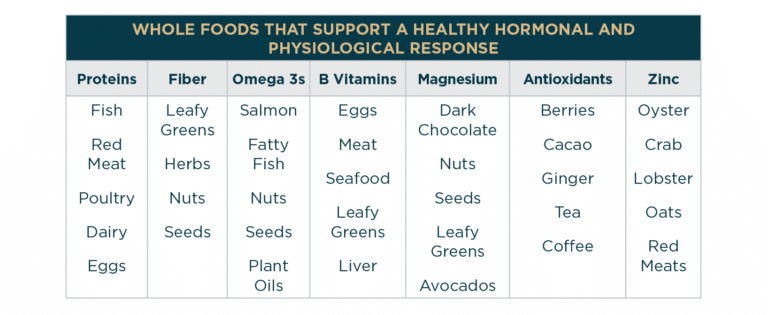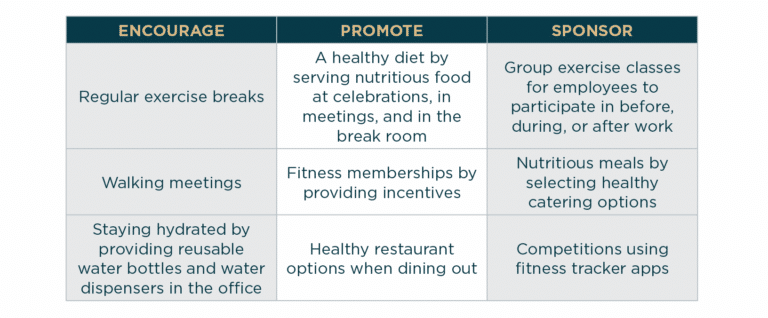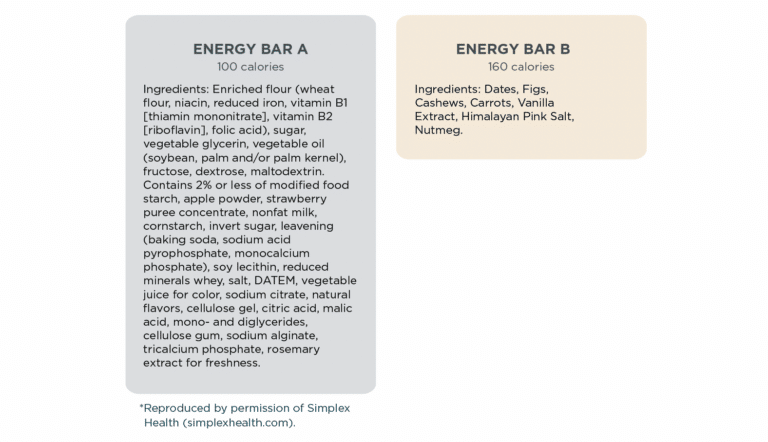How to Cultivate Healthy Habits in the Workplace
Developing a Fitness and Nutrition Mindset for Busy Professionals
Meet Sam, a Christian executive who wants to stay physically fit while excelling at his stressful job. However, implementing healthy habits in the workplace seems like a struggle. He knows he and his team, along with 88% of other adults, are metabolically unhealthy. He spends the majority of his workday at his desk, sitting for an average of nearly six hours a day. When he wants something to eat, he browses the food at the office—most of which is high in sodium, solid fats, refined grains, and added sugars and will add an average of 1,300 extra calories to his weekly intake. Sam, like 91% of employed Americans, is interested in healthier lunch options, but for today, he grabs a burger and fries. At the end of the day, Sam feels tired and lethargic, lacking the energy to exercise or spend intentional time with God.
In comparison, meet Hannah. She is also a Christian executive, and about a year ago, she successfully integrated healthy habits in the workplace for herself and her employees. She starts her day with prayer and meditation. At the office, she successfully lobbied her boss to invest in standing desks, giving employees an opportunity to stretch their legs throughout the day. The snacks at Hannah’s office range from nutrient-dense protein bars to fresh fruits. When the team orders in, they ensure healthy options like salads and meals with lean protein. During breaks, Hannah and her team will go on group walks and enjoy the fresh air. In the evening, Hannah spends about half an hour to an hour doing moderate exercise before bed.
———
As a Christian business leader, you play a crucial role in setting the tone of your workplace, much like Sam and Hannah. Striving for a balanced life where all aspects are in harmony honors God and promotes overall health.

Implementing fitness and nutrition into your lifestyle can be challenging, especially with a busy schedule. However, there are steps you can take to transform your health and make it easier to steward within your time restraints. A commitment to health and wellness begins with you. When you commit to improving your fitness and nutrition habits, you become a model for those you lead in the workplace.
In 1 Corinthians 6:19, the Apostle Paul says that your body is a dwelling place of the Holy Spirit. Therefore, caring for your physical body is a way to honor God as your Creator. As a leader, you are responsible for setting an example for others by prioritizing physical wellness and promoting it within your company.
Misconceptions and Myths about Fitness and Nutrition
When beginning a fitness and nutrition journey, you battle a variety of myths. There are many different opinions, misconceptions, and sources of information, and it can be difficult to separate truth from myth when trying to develop a healthy lifestyle for yourself and others in your workplace. Knowing the common myths can help you avoid fitness and nutrition scams:
“Exercise More and Eat Less”
You have likely heard the phrase, “Exercise more and eat less.” At first glance, this may seem true—but the statement is misleading. Studies have shown that “poor nutrition has nearly three times the impact on health as low fitness.” You can exercise consistently, but if you are not accounting for your macros (carb, fat, and protein intake), you may still struggle to meet your health goals—even if you are “eating less.” Controlling your diet is more effective for losing weight, while exercise is key to maintaining weight loss. However, focusing on both is always beneficial.
“Everything in Moderation”
While “everything in moderation” sounds like a good idea, it can be a dangerous pitfall. Unfortunately, many of the foods you would only want to eat in moderation are designed to be hyper-palatable (“artificially rewarding and harder to stop consuming”)—leading to addiction-like cravings that can cause overeating.

It may be better to avoid these unhealthy, addictive foods altogether rather than risk overindulging in them. While this may be difficult at first, the more you exercise your willpower, the better you will become at resisting unhealthy food cravings.
“A Calorie Is Just a Calorie”
While one calorie does equal one calorie, not all foods—and the calories in them—are created equal. You can eat a portion of cake with the same caloric value as fruit and nuts, but the fruits and nuts will keep you fuller for longer, provide your body with important nutrients like fiber and key vitamins, and even increase your energy and productivity levels.
Consider the ingredient lists for two popular energy bars:
If you focused only on calories, you would likely select Energy Bar A. However, the ingredient list shows an abundance of added sugars and difficult-to-pronounce ingredients—a telltale sign that the food was highly processed.
When you choose your next snack or meal, consider the nutritional value beyond the calories. Something with slightly more calories may have more healthy fats, protein, and fiber than processed foods with fewer calories, making the high-calorie option more beneficial for your body in the long run.
Breaking Down the Barriers for Busy Professionals
Before you can establish health goals or daily habits, you must understand what is keeping you from succeeding. As a leader, there are three barriers you frequently face:
Time: Time is a precious resource, and it often feels like you have very little of it. Forming habits and working toward health goals takes time you often feel you do not have. The truth is you make time for what is important to you. Dedicating as little as 30 minutes daily to exercise is adequate for most adults and can drastically improve your fitness.
Motivation: The mere thought of exercising or preparing healthy meals can be exhausting. Often, the best way to combat a lack of motivation is by caring for your fitness and nutrition when you have the most energy. For example, if you feel refreshed and rejuvenated in the mornings, do not wait until after work to go to the gym—take advantage of your energy when you wake up. Likewise, if you are more of a night owl, use your free time in the evenings to take a walk or jog.
Decision Fatigue: We are bombarded with decisions every day. Like many, when you think about exercise, you may be overwhelmed with questions such as:
Where should I go?
When will I go?
Which exercises am I going to do?
How many reps should I do?
This thought process fosters exhaustion and decreases the likelihood of committing to a consistent plan.

The solution lies in creating and adhering to a fitness and nutrition plan, ensuring that health goals are not left to impulsive choices. By planning meals prior to hunger strikes and establishing a regular exercise routine before exhaustion sets in, you can avoid the temptation of fast, unhealthy foods and the urge to skip the gym.
How Executives Can Develop Healthy Habits That Last
The more you stick to a routine, the more likely it is to become a habit—something you can do with little thought or mental effort. This idea is especially important when trying to implement a healthy lifestyle. Your health journey does not need to be a radical transformation. Experts have found that small changes are key to forming sustainable habits.
Set specific fitness and nutrition goals, and take small steps to work toward them. Embracing a new lifestyle can be hard. James Clear, author of Atomic Habits: An Easy & Proven Way to Build Good Habits & Break Bad Ones, recommends the following three strategies when it comes to establishing new habits:
1. Make It a Daily Ritual
Achieving goals often requires a structured plan. One of the simplest ways to establish a healthy habit is by setting a schedule for yourself: “During the next week, I will exercise on [DAY] at [TIME OF DAY] at/in [PLACE].” Merely writing out your goals increases the likelihood of achieving them. Research indicates that creating a plan, such as the example provided above, makes you 2–3 times more likely to succeed in your goals. Download C12’s Fitness and Nutrition Goal Guide for Busy Professionals to begin outlining your goals, your reasons for pursuing them, and how you intend to achieve them:
2. Small Steps Forward
When developing a new habit, the smaller the goal, the more achievable it is. You want to create goals that feel achievable even when you are low on energy and motivation—goals that are “so easy you cannot say no.”

3. Habit First, Results Later
When developing habits, establishing a routine that you can consistently adhere to is crucial. Prioritizing results before solidifying the habit can result in discouragement, particularly if you still need to achieve consistency in your routine. Initially, focus on building discipline and sticking to your routine. Once you find it easy to commit to your routine, you can shift your attention toward achieving results.
Fitness and Nutrition Strategies for Business Leaders
Consistently implementing healthy choices over time can make a big impact. Like the business decisions you make every day, the key to success is having a good, proven strategy in place. Focusing on even just one strategy can make a vast difference in your health and wellness. To get started, here are a few ways to promote fitness and nutrition:
Eat Healthy, Whole Food
God has provided you with various whole foods that are made to fuel your body, meet your daily needs, and keep you healthy. Experts have found that well-intentioned people struggle with making good diet decisions because they are fighting a vicious cycle:
You can break this cycle by fueling yourself with God-given, whole foods that help balance your body and provide long-lasting satisfaction and nourishment. While processed foods may taste good and are easy to consume, they are not what God intended you to eat.

The chart below highlights whole foods you can implement in your diet and the benefits they provide:

Intermittent Fasting
While the ancient rituals of prayer and fasting are spiritually rewarding, fasting can also benefit your health. One way to implement this practice is to try intermittent fasting, a practice that many busy professionals find to be an easy way to manage their nutrition. Intermittent fasting has become increasingly popular in the last few years, and it has several benefits, including:
- Improved weight loss
- Reduced inflammation
- Lowered risk for type 2 diabetes
- Minimized decision fatigue
- Increased cardiovascular health
There are three popular fasting schedules:

Ultimately, choosing which schedule to adopt depends on what suits you and your body best. You can experiment with different schedules over a week or two to determine which makes you feel best and most productive.
Commitment to Exercise
Exercise is a vital component of a healthy lifestyle, complementing proper nutrition to optimize your overall well-being. Just as God has provided nourishing whole foods for your body, He has also designed it for movement and activity. The table below outlines the advantages of exercise and offers some practical tips to help you make it a regular habit.
|
|
| Physical Health: Regular exercise strengthens your muscles, bones, and cardiovascular system, reducing the risk of chronic diseases like heart disease, diabetes, and obesity. | Find Activities You Enjoy: Whether it is jogging, swimming, yoga, or dancing, choose activities that you genuinely enjoy. When exercise is enjoyable, you are more likely to stick with it long-term. |
| Mental Health: Exercise releases endorphins, which can uplift your mood, reduce stress, and alleviate symptoms of anxiety and depression. | Set Realistic Goals: Start with achievable goals, such as exercising for 30 minutes three times a week, and gradually increase intensity and duration as you progress. |
| Cognitive Function: Physical activity has been linked to improved cognitive function, memory, and concentration, enhancing productivity and mental clarity. | Mix It Up: Incorporate a variety of exercises to keep your routine interesting and prevent boredom or plateaus. This could include a combination of cardio, strength training, flexibility, and balance exercises. |
| Longevity: Research consistently shows that individuals who exercise regularly live longer, healthier lives than their sedentary counterparts. | Buddy Up: Partnering with a friend or joining group fitness classes can provide accountability and motivation, making exercise more enjoyable and social. |
Just as with nutrition, consistency and intentionality are key to fitness. By prioritizing physical activity and making it a regular part of your lifestyle, you will enhance your health and experience greater vitality and overall well-being.
Promoting Health Initiatives in the Workplace
The “average employee works around eight hours per weekday.” This is a sizeable chunk of daily life for both you and your employees. As a Christian leader motivated by God’s call to steward your body well, imagine how much you could improve the health outcomes for those at your company if you committed to healthy habits in the workplace. The chart below provides an example of how you could encourage, promote, and sponsor health-related goals within your company:

In white-collar office jobs, employees spend a lot of time sitting and remaining stationary, which can increase their body mass index. Alternatives to sitting at your desk all day include:
- Purchasing a walking pad or stationary bike
- Investing in standing desks
- Swapping chairs for exercise balls
- Incorporating walking breaks into your schedule
Setting an example and encouraging your team to engage with workplace health initiatives can yield significant benefits. According to one study, workplace nutrition and health interventions proved to be an effective way to improve the health status of employees. Participants in this study were able to increase their consumption of fruits and vegetables by 15% and lower their body mass by 5%.
The benefits of promoting health and wellness with your employees cannot be overstated:
- Increased productivity
- Improved morale
- Reduced healthcare costs
- Stronger camaraderie
- Minimized absenteeism
- Fewer distractions
- Greater alertness
You will want to maximize these benefits by getting as many of your employees involved in health initiatives as possible. To do this, you can incentivize your team to participate through competition and community:
- Competition: Set up friendly competitions for weight loss or step challenges. Include rewards or prizes for “winning” to help boost interest and raise the stakes.
- Community: Encourage employees to work on teams to achieve fitness and nutrition goals. This could look like group walks during breaks or encouraging an accountability partner system within the team.
Establishing a workplace culture that prioritizes fitness and nutrition demonstrates care for your employees’ physical and mental well-being. Implementing healthy habits in the workplace will not require a complete overhaul of your company’s work schedule —small changes can yield significant results over time.
Healthy Habits Can Change Your Life
Tony Holt’s health journey began when he received his first diagnosis of high blood pressure at 25. Over the years, he was diagnosed with high cholesterol at 30, borderline diabetes at 35, congestive heart failure at 40, and ultimately prostate cancer. With these challenges, Tony struggled to understand why God allowed him to experience such hardships. Watch this video to see how Tony transformed his life in just 90 days:
Honoring God with Health Initiatives in the Workplace
What if Christian companies had a reputation for actively promoting health initiatives in the workplace? You honor God with your body when you care for it through nourishing foods, exercise, and rest. As a leader, you influence your company toward progress in this vital area. It is never too late to make positive changes.
By investing in your fitness and nutrition, you not only enhance your own energy and longevity as a leader but also set a powerful example for your team to follow. Taking the initiative to promote health in the workplace can positively impact the lives, well-being, and productivity of your team, yielding eternal results for a greater purpose.
C12 Business Forums provides an architected environment for Christian business leaders that integrates work, life, and leadership transformation. To learn more about C12’s approach to Christ-centered business leadership, find a C12 Business Forum near you.
About the Author
C12 Editorial Team
C12 is the largest peer-learning organization for Christian CEOs, business owners, and executives and a leader in the marketplace ministry movement. Located in over 160 major metro areas across the United States, Brazil, Malaysia, Singapore, Taiwan, and South Africa, C12 serves businesses with 10 to 10,000+ employees and annual revenues ranging from $2 million to $5 billion. C12 Business Forums provides an architected environment for Christian business leaders that integrates work, life, and leadership transformation. Led by full-time C12 Chairs—veterans of business with ownership or C-Suite experience—our CEO and Key Player Forums equip members with resources and tools to steward a BaaM (Business as a Ministry) vision to build great businesses for a greater purpose. For more information, please visit C12 Business Forums.
May 9, 2024





